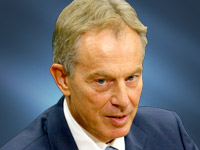Blair rumour mill to overshadow economy, climate funding talks
 Brussels - The search for a new European boss threatened to overshadow key talks on the economy and on climate change at a European Union summit due to open in Brussels on Thursday.
Brussels - The search for a new European boss threatened to overshadow key talks on the economy and on climate change at a European Union summit due to open in Brussels on Thursday.
The name of former British Prime Minister Tony Blair was frequently mentioned in discussions about who should become European Council President, a post created by the EU's reforming Lisbon Treaty to give the bloc a stronger voice on the world stage.
EU heads of state and government planned to sound each other out about Blair's chances amid strong opposition from smaller member states such as Belgium and Luxembourg, which would prefer a low-profile moderator instead.
The president of the European Parliament, Jerzy Buzek, weighed into the discussion Thursday by arguing that Britain's refusal to join the bloc's common currency and its borderless Schengen area should not count against Blair.
But, echoing calls from European Commission President Jose Manuel Barroso for a greater gender balance within the EU's institutions, Buzek also suggested that the job should go to a woman instead.
"A woman as first EU president would be a good idea," Buzek said.
No formal appointments were expected to be announced at the summit, however, as the Lisbon Treaty has been stalled by the Czech Republic's eurosceptic president, Vaclav Klaus.
Klaus, whose signature is the final obstacle to the treaty coming into force, is awaiting a decision by his country's constitutional court and is demanding political guarantees in connection with the text's charter of fundamental rights.
"People in Brussels are all asking: 'Will (the president) be Blair?' We're miles away from that question still," an official close to the negotiations told the German Press Agency dpa ahead of the summit.
However, hopes of a positive outcome to what is referred to in Brussels as the "Czech problem" were raised Wednesday, when Slovak Prime Minister Robert Fico signaled that his country would not seek an exemption from the charter.
Slovakia, like the Czech Republic, had expressed concern that the charter might usher in property claims by the former Czechoslovakia's ethnic German population, which was expelled from the country after World War II.
Diplomats warned that discussions about the bloc's institutional setup threatened to distract leaders away from the official agenda, which focuses on the poor state of the European economy and on how to fund the global fight against climate change ahead of international talks due to take place in December in Denmark.
"The (European) Union has a strong negotiating position, in particular thanks to the excellent work conducted by our Environment Ministers on issues such as technology transfer, adaptation, mitigation and good governance," Swedish Prime Minister Fredrik Reinfeldt wrote in his invitation letter to fellow leaders.
"However, it is clear that a deal on financing will be central to reaching agreement in Copenhagen," said Reinfeldt, who was to chair the summit as current holder of the bloc's rotating presidency.
The EU's executive arm, the European Commission, has said rich nations should help the world's poorer countries adapt to climate change by providing billions of euros of public funds.
But a deal on how to share the bill among EU member states has been blocked by Poland and other Eastern European countries with relatively low incomes and high pollution levels.
Negotiators were also complaining that EU heavyweight Germany was being unhelpful by refusing to discuss numbers during the talks.
"A divisive discussion on internal EU burden sharing would be counter-productive for the Union's overall ambitions on climate change," said Finnish Prime Minister Matti Vanhanen.(dpa)